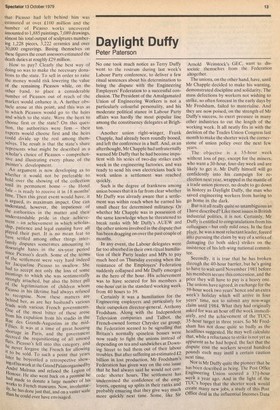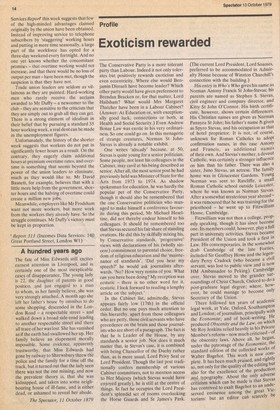Daylight Duffy
Peter Paterson
No one took much notice as Terry Duffy went to the rostrum during last week's Labour Party conference, to -deliver a few ritual sentences about his determination to bring the dispute with the Engineering Employers' Federation to a successful conclusion. The President of the Amalgamated Union of Engineering Workers is not a particularly colourful personality, and his moderate political stance in Labour Party affairs was hardly the most popular line among the constituency delegates at Brighton.
Another union right-winger, Frank Chapple, had already been roundly booed, and left the conference in a huff. And, as an afterthought, Mr Chapple had unfraternally warned Mr Duffy that he had becOme impatient with his series of two-day strikes each week in the engineering factories, and was ready to send his own electricians back to work unless a settlement was reached quickly.
Such is the degree of frankness among union bosses that it is far from clear whether Mr Duffy was already aware that a settlement was within reach when he earned his small cheer for determined militancss Or whether Mr Chap* was in possession of the same knowledge when he threatened to break ranks with Mr Duffy's AUEVV and the other unions involved in the dispute that has been dragging on over the past couple of months.
In any event, the Labour delegates were far too absorbed in their own ritual humiliation of their Party leader and MPs to pay much heed on Thursday evening when the resistance of the Employers' Federation suddenly collapsed and Mr Duffy emerged as the hero of the hour. His achievement was to have secured for his members a one-hour cut in the standard working week from 40 hours to 39.
Certainly it was a humiliation for the Engineering employers and patticularly for their outspoken director-general, Anthony Frodsham. Along with the Independent Television companies and Talbot, the French-owned former Chrysler car group, the Federation seemed to be signalling that Britain's normally spineless bosses were now ready to fight the unions instead of depending on tea and sandwiches at Downing Street to bail them out of their labour troubles. But after suffering an estimated £2 billion in lost production, Mr Frodsham 's Federation has given way on the one issue that he had always said he would not concede: shorter hours. The settlement has undermined the confidence of the employers, opening up splits in their ranks and probably ensuring that they give way much more quickly next time. Some, like Sir Arnold Weinstock's GEC, want to dissociate themselves from the Federation altogether.
The unions, on the other hand, have, until Mr Chapple decided to make his warning, demonstrated discipline and solidarity. The mass defections by workers not wishing to strike, so often forecast in the early days by Mr Frodsham, failed to materialise. And they are now poised, on the strength of Mr Duffy's success, to exert pressure in many other industries to cut the length of the working week. It all neatly fits in with the decision of the Trades Union Congress last month to make the shorter week the cornerstone of union policy over the next few years.
The objective is a 35-hour week without loss of pay, except for the miners, who want a 30-hour, four-day week and are likely to get it. Mr Duffy himself will go confidently into his campaign for reetection next year, wrapped in the mantle of a trade union pioneer, no doubt to go down in history as Daylight Duffy, the man who saved engineering workers from having to go home in the dark.
But is it all really quite so unambiguous as I have described? Like most issues in British industrial polities, it is not, Certainly, Mr Duffy is entitled to congratulations from his colleagues — but only mild ones. In the first place, he was a most reluctant leader, forced into pursuing the claim by way of a series of damaging (to both sides) strikes on the insistence of his left-wing national committee.
Secondly, it is true that he has broken through the 40-hour barrier, but he's going to have to wait until November 1981 before his members secure this concession, and the price they will have to pay is a heavy one. The unions have agreed, in exchange for the 39-hour week two years' hence and an extra week's holiday which will arrive in four years' time, not to submit any non-wage claim until 1984. What they had originally asked for was an hour off the week immediately, and the achievement of the TUC's 35-hour target in three years. So Mr Frodsham has not done quite so badly as the headlines suggested. He may well calculate that, while a reluctance to strike is not yet as apparent as he had hoped, the fact that the dispute cost the workers several hundred pounds each may instil a certain caution next time.
Nor is Mr Duffy quite the pioneer that he has been described as being. The Post Office Engineering Union secured a 371-hour week a year ago. And in the light of the TUC's hopes that the shorter week would create many new jobs, a study of this Post Office deal in the influential Incomes Data
Services Report this week suggests that few of the high-minded advantages claimed originally by the union have been obtained.
Instead of improving service to telephone subscribers by 'staggering' working hours and putting in more time seasonally, a large part of the workforce has opted for a three-day weekend every fortnight. And no one yet knows whether the concomitant promises — that overtime working would not increase, and that there would be no loss of output per man — have been met, though the suspicion is that they have not.
Trade union leaders are seldom as villainous as they are painted. Hard-working men who rarely receive the acclaim awarded to Mr Duffy — a newcomer to the club — they are sensitive to the criticism that they are simply out to grab all they can get. There is a strong element of idealism in their belief that by pursuing a standard 35 hour working week, a real dent can be made in the unemployment figures.
Unfortunately, the history of the shorter week suggests that workers do not put in significantly fewer hours as a result. On the contrary, they eagerly claim additional hours at premium overtime rates, and overtime is something that seems beyond the power of the union leaders to eliminate, much as they would like to. Mr David Basnett, for example, believes that with a little more help from the government, shorter hours and the halving of overtime could create a million new jobs.
Meanwhile, employers like Mr Frodsham want not more workers, but more work from the workers they already have. So the struggle continues. Mr Duffy's victory must be kept in proportion.
s' Report 313 (Incomes Data Services: 140 Great Portland Street, London WI)



































 Previous page
Previous page